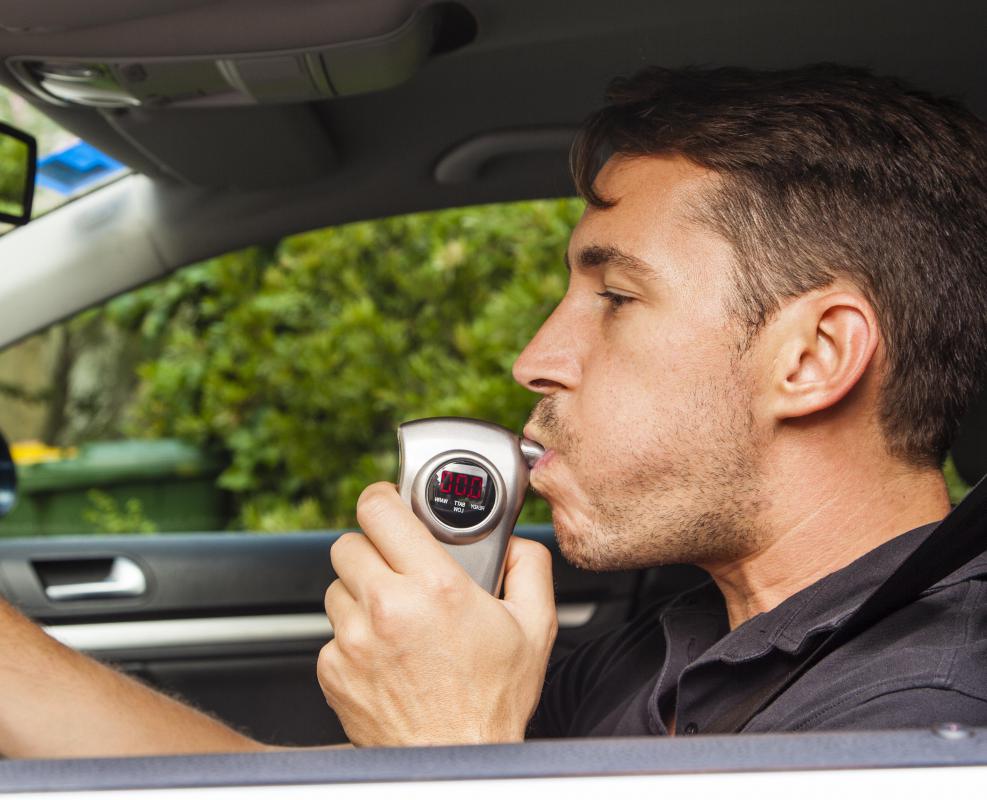At WiseGEEK, we're committed to delivering accurate, trustworthy information. Our expert-authored content is rigorously fact-checked and sourced from credible authorities. Discover how we uphold the highest standards in providing you with reliable knowledge.
Should I Refuse a DUI Test?
A driving under the influence (DUI) test is administered when a police officer has reason to believe that you may have been operating a motorized vehicle while intoxicated. The police officer may stop you while you are driving and ask you to take a DUI test. You always have the option to refuse to take it. There are certain consequences for refusing to take a DUI test, however, and you should be prepared to accept these when you refuse.
There are three types of DUI tests. The first type is the field sobriety test (FST), which is conducted on the roadside of the area where you were stopped. A police officer will have you perform a sequence of physical maneuvers that would be difficult for an individual in an inebriated state. These include having you track an item with your eyes as it travels 6 inches (about 15.24 cm) from your nose, picking up an object from the ground while standing on one leg, walking heel-to-toe in a straight line, touching your nose with your eyes closed, reciting the alphabet backward, and estimating 30 seconds with your eyes closed and head tilted back.

Field sobriety tests are not considered accurate, as there is no hard evidence for the officer to base his judgment on. The police officer relies on his own observation of your performance. If an officer has you go through a field sobriety test, it is an indication that he already believes that you are intoxicated. The officer is then looking for proof that will confirm his suspicions in the field sobriety test, rather than withholding judgment and using it to decide your state of sobriety.

These tests are considered to be designed for failure and can make you appear intoxicated even if you are not. A high percentage of people who are not drunk fail these tests in the eyes of the officer testing them. You are within your legal rights to refuse this test and there are no legal repercussions for refusing, but be warned that refusing to take it could be seen as an indication of guilt.

The chemical DUI test is the second kind of test. Types of chemical DUI tests include a Breathalyzer® test, urine test, and blood test. The Breathalyzer® test, also known as the Preliminary Alcohol Screening (PAS) Test, was created on the premise that your breath comes from your lungs, but actually measures the alcohol residue in the esophagus, mouth, or digestive system.

A Breathalyzer® test is considered inaccurate as usage of mouthwash, mints, breath spray, or even burping can affect the results. This test is not available for analysis later by your attorney or yourself as it is not saved. You may wish to refuse this test and opt for one of the other two kinds of chemical DUI tests if you are concerned about accuracy. There are no legal penalties for refusing this test, and it is considered voluntary.
The urine test examines your urine for the presence of alcohol and drugs. This is considered the least accurate of the three chemical DUI tests. Note that its lack of reliability is such that some areas do not even include this test as a choice of chemical DUI tests. The amount of time between your final drink and the time of the test can have a noticeable effect on the results of the test.
A blood test, otherwise known as the Blood Alcohol Content (BAC) Test, examines a sample of your blood for the presence of alcohol and drugs. This test is considered the most accurate of the three chemical DUI tests. Given the choice, you should choose this test to take if you are certain that your alcohol intake was below the legal limit.
You can refuse to take a chemical DUI test in most places prior to arrest, but refusal can lead to serious penalties. Police officers in some areas can physically restrain you to administer a blood test. In most areas, your license will be automatically suspended for months or even a year if you refuse to take a test. Note that the prosecutor can also use your refusal to take the test as evidence in trial.
If, however, you have already been arrested for DUI, you cannot refuse to take a blood test. In the US, blood tests are covered by implied consent laws. This means that when you obtained your driver's license, you gave your implied consent to submit to a BAC test upon being lawfully arrested for DUI.
AS FEATURED ON:
AS FEATURED ON:














Discuss this Article
Post your comments